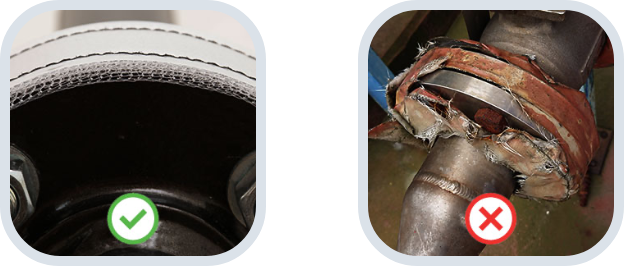Menu
Close Menu
Flange spray shields are used in a variety of industries where their primary application is the prevention of mist formation and dangerous/harmful spray-outs resulting from failing pipe joints. Controlling these dangerous leaks or sprays of toxic, corrosive, and hazardous liquids such as acid, oil, or steam is imperative to maintaining a safe and manageable workspace.
Manufactured from All-PTFE materials (no fiberglass) comprising clear ECTFE outer and multi-layered ETFE mesh inner. This material provides unparalleled chemical resistance. All our shields are tested on our hydrostatic pressure test facility, test certificates are available on request.
The internal mesh is compressed against the flange and prevents direct and lateral spray. The liquid pressure inside is rapidly diffused, resulting in a safe drip-release.

Various, highly corrosive fluids are used in the chemical industry. It is important to select a safety shield design and material which is compatible with the process. For example, for PTFE-lined pipeline, it follows that flange guards should also have the relevant PTFE coating. It would be impossible to list every process chemical used, but typical applications include acetic acid, aluminum sulphate, hydrochloric, Nitric, oleum, phosphoric, sodium hydroxide, Sulphuric, titanium tetrachloride.
Fuel oil, lubrication oil, thermal oil & even diesel under pressure, can represent an explosion hazard if the leak forms a "Mist" or "Vapor cloud" that later ignites. Flange and Valve Guards can reduce this risk by controlling the spray out, condensing the vapor into a liquid and producing a safe drip. Many customers have used our Guards to reduce / re-classify ATEX hazardous area as a part of a DSEAR review.
Please contact us for more information on our unique high pressure "Secondary Grade" leak tests on "Fixed Part" Sealing Elements, in accordance with BS EN 60079-10-1:2015
Liquefied Natural Gas (LNG) is a natural gas containing methane which, when converted into a liquid state, is not explosive and cannot ignite.
Why is it converted to LNG?
Natural gas is converted into LNG as it is much easier to store and transport, particularly as it requires about 1/600th the volume of natural gas.
For LNG to be used as a gas it first needs to be converted back from a liquid state to a gas state. This is done at regasification plants.
How is LNG Transported?
From its initial processing to convert from a natural gas to LNG, LNG will pass through numerous processes from treatment and liquefication plants to storage, shipping then into final storage before regasification.
Is it explosive?
Although in its liquid state LNG is not explosive and cannot ignite, if vaporized and mixed with air it becomes combustible. This can occur if LNG were to leak from a faulty flange joint in a pipeline during movements between processing, storage, transportation and regasification. The LNG would vaporize rapidly at which point if it reaches a source of ignition would catch fire.
How can I mitigate risk?
Liquified Natural Gas (LNG) projects have numerous applications for safety shields, whether it be the cryogenic LNG process itself or one of the many other chemicals used.
The flange joints along the LNG lines themselves need to be shielded to prevent a jet release which would otherwise permit LNG vapor to mix with air and become combustible. This can be done by installing spray safety shields on flange joints stopping the formation of a mist/vapor cloud.
Flangeguards has successfully delivered many thousands of safety shields for LNG applications on projects all around the world. Installation of Sureband Steel spray safety shield to the flanges of pipelines at LNG processing plants and storage facilities control LNG spray out, preventing risk of fire and explosion.
Mono-ethylene glycol (MEG) is used in the production of polyester fibers, polyethylene terephthalate (PET), coolants in vehicle antifreeze and resins. If inhaled, MEG mist may cause a mild burning sensation in the nose, throat and lungs.
Therefore, it is important to take steps to prevent MEG leakage creating vapor or mist.
Safety shields should be installed on pipework flanges to diffuse the leak and prevent mist formation.
If you have questions, please don’t hesitate to contact us or look into our knowledge base to help find the right answer. We look forward to exceeding your expectations in both quality and service.

Getting To Know: Sureband® Steel
This shield design comprises a steel band and an internal layer of steel mesh which is compressed against the flange itself. This mesh, which is crimped along the centre to fill...


SureBand® - The Innovative Safety Spray Shield
APG and Flange Guards have teamed up to bring the best selling safety spray shield from across the pond here to the United States. This safer, quicker, and better solution...

Written By:
Please Fill Out This Form To Be Contacted By An Expert